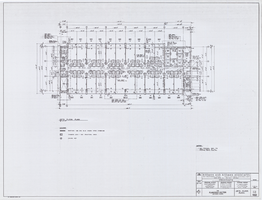Search the Special Collections and Archives Portal
Search Results

Architectural drawing of the Flamingo Hilton tower addition (Las Vegas), 28th floor plan, July 27, 1976
Date
Archival Collection
Description
Architectural plans for the addition of a tower to the Flamingo in 1976. Reduced sheet. Original material: parchment. Socoloske, Zelner and Associates, structural engineers; Harold L. Epstein and Associates, structural engineers; Bennett/Tepper, mechanical engineers; J. L. Cusick and Associates, electrical engineers.
Site Name: Flamingo Hotel and Casino
Address: 3555 Las Vegas Boulevard South
Image
Blue Diamond Mine Photograph Collection
Identifier
Abstract
The Blue Diamond Mine Photograph Collection depicts operations at the Blue Diamond Mine from approximately 1950 to 1971. The photographs include images of heavy machinery, mining structures, and workers. The photographs also contain aerial views of Blue Diamond Mine and the surrounding landscape.
Archival Collection
University of Nevada, Las Vegas Women's Studies Department Records
Identifier
Abstract
Records are comprised of memoranda, committee minutes, and planning documents from the University of Nevada, Las Vegas (UNLV) Women's Studies Department from 1966 to 1993. The records document the inception of both the Women's Center and Women's Studies program at UNLV. The materials from the Women's Center document the efforts of UNLV staff to begin a women's center on campus and efforts to create a Women's Studies program.
Archival Collection
Insignia Films Research for the American Experience: Las Vegas - An Unconventional History
Identifier
Abstract
The Insignia Films Research for the "American Experience: Las Vegas - An Unconventional History" collection (1968, 2004-2005) contains photocopied research material, primarily drawn from Nevada newspapers, photographic prints, Betacam and VHS videotapes with interviews and footage used in the Public Broadcasting System (PBS) series "American Experience: Las Vegas - An Unconventional History," created for the Las Vegas Centennial, Las Vegas, Nevada. Also included are original issues of Look magazine with Las Vegas, Nevada coverage, and a United States Freedom of Information Act (USFOIA) report on Tony Spilotro.
Archival Collection
Shade Tree Shelter Records
Identifier
Abstract
The Shade Tree Shelter Records date from 1990 to 1996 and consist primarily of logbooks and journals compiled by the staff of the Shade Tree, a shelter for homeless and abused women and children in Las Vegas, Nevada, documenting daily activities, incidents, and residents at the shelter. The collection also includes summaries of the staff's telephone conversations, a newspaper article about Shade Tree, and fliers and brochures about social services available in Southern Nevada.
Archival Collection
Jackie Brett Collection on Las Vegas, Nevada Entertainment
Identifier
Abstract
The Jackie Brett Collection on Las Vegas, Nevada Entertainment (1977-1996) consists of writings by Jackie Brett and publications and clippings about Las Vegas, Nevada entertainment and tourism. Brett worked for the Nevada Commission on Tourism and promoted southern Nevada through her column "Brett's Vegas View." She wrote about production shows, concerts, special performances, and events as well as the overall development of Las Vegas tourist industry in the 1980s and 1990s.
Archival Collection
Credit Professionals of Las Vegas Records
Identifier
Abstract
The Credit Professionals of Las Vegas Records (1941-1999) include information about the organization and its two predecessors, the Credit Women's Club of Las Vegas, Nevada and the Credit Women's Breakfast Club of Las Vegas, Nevada. The collection includes scrapbooks, procedure manuals from the local and international division of the organization, awards received by the local division, and regional and local newsletters.
Archival Collection
Dennis McBride Collection of Gay Erotica
Identifier
Abstract
The Dennis McBride Collection of Gay Erotica (1960-2006) contains a selection of pornographic publications, three VHS tapes of erotic films, and photographic prints mail ordered from gay erotica or physique photography studios. The three studios represented in this collection are Alexander Studio, Sierra Domino Studio, and Third World Studio.
Archival Collection
Dorothy Keeler Papers
Identifier
Abstract
The Dorothy Keeler Papers (1811-1977) document early Las Vegas history, the life and career of former United States Mint director Eva Adams, and contain images of the Western United States and Southern Nevada in the 1930s. The collection contains clippings on the history of Las Vegas and early Las Vegas weddings as well as photographs documenting the Keelers' travels throughout the Western United States and the construction and dedication of Hoover Dam.
Archival Collection
Robert Worts Photographs
Identifier
Abstract
The Robert Worts Photographs depict the Corn Creek Ranch in Nevada from 1936 to 1939. Located northwest of Las Vegas, Nevada, Corn Creek Ranch was home to writer George F. Worts in the late 1930s. Materials in the collection include photographs of Worts, buildings on Corn Creek Ranch, and a camp on Mount Charleston.
Archival Collection
